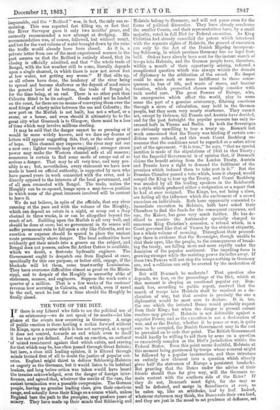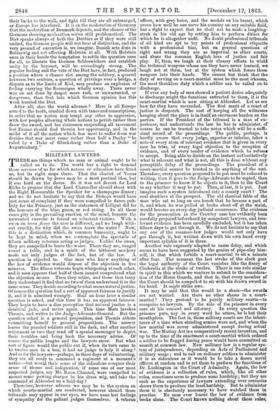THE VOTE OF THE DIET.
I F there is any Liberal who fails to see the political use of an aristocracy—we do not speak of its merits—let him glance at the events now occurring in Germany. A surge of public emotion is there hurling a nation forward without its Kings, upon a course which it has not surveyed, at a speed it does not control, towards an end which even to itself it has not as yet defined. Just such an emotion, an outburst of mixed resentment against that which exists, and craving for that which may be, has often passed through Great Britain; but here, a class still leading opinion, it is filtered through minds trained first of all to doubt the justice of popular out- cries. England might thirst to deliver Schleswig-Holstein as eagerly as the Germans, but it would listen to its habitual leaders, and long before action was taken would have heard the treaties acknowledged, seen the danger of foreign inter- ference, and weed that, whatever the merits of the case, the easiest termination was a passable compromise. The German people, having no genuine leading class, give their emotions range, and actually force their Kings on a course which, unless England bars the path to the precipice, may produce years of misery. They have made up their minds that Schleswig and Holstein belong to Germany, and will not pause oven for the forms of political discussion. They have already overborne the smaller Courts, and their representatives have, by a small majority, voted in full Diet for Federal execution. As King Christian had already cancelled the patent which interfered with the separate rights of Holstein, the ground of execution can only be the Act of the Danish Rigsdag incorporat- ing Schleswig, in which province Germany has no legal foot- hold. Orders have already been sent for the instant march of troops into Holstein, and the German people have, therefore, within a month of their opportunity arising, referred a complicated question which was always within the domain of diplomacy to the arbitration of the sword. No despot could be more rash or more indifferent to those conse- quences in loss of life, and waste of stores, and heavier taxation, which propertied classes usually consider with such useful care. The great Powers of Europe, who, in emergencies which affect the world, play in some sense the part of a genuine aristocracy, filtering emotions through a sieve of calculation, may hold in the German people, but they seem very nearly overborne. They cannot act, except by violence, till Prussia and Austria have decided, and for the past fortnight the popular pressure has only in- creased both in Vienna and Berlin. In both the Sovereigns are obviously unwilling to tear a treaty up. Bismark last week announced that the Treaty was binding if certain con- . ditions were refused, and this week Count Rechberg an- nounces that the conditions must be regarded as a substr ntive part of the agreement. "It is true," he says, "that no special, mention is made of the stipulations of 1851 in that Treaty ; but the Imperial Government is of opinion that, if Denmark claims the benefit arising from the London Treaty, Austria and Prussia have a right to demand the fulfilment of the promises which induced them to take part in it." But the Prussian Chamber passed a vote which, were it obeyed, would compel the King to tear up the Treaty, and Count Reohberg was assailed by all the leading speakers in the Reichsrath in a style which produced either a resignation or a report that he had at once resigned. The Kings, too, not being a class, are feeling all the influence which the excitement of a crowd exercises on individuals. Both have apparently consented to immediate execution in Holstein, both have asked their Chambers to find the funds for the consequent expenses, and one, the Kaiser, has gone very much further. He has de- clined to receive the Ambassador specially charged to announce King Christian's accession, a refusal which, in a Court governed like that of Vienna by the strictest etiquette, has a whole volume of meaning. Throughout their proceed- ings there is evidence that the Sovereigns, though unable to shut their eyes, like the people, to the consequences of break- ing the treaty, are falling more and more rapidly under the dominion of the popular sentiment. The impelling force is growing stronger while the resisting power dwindles away. If these two Powers will not stop the troops nothing in Germany can, and a collision can only be averted by the moderation of Denmark.
But will Denmark be moderate ? That question also depends, we fear, on the proceedings of the Diet, which at this moment is obeying an emotional popular cry. Den- mark has, according to public report, resolved that the march of troops into Holstein shall be received as a de- claration of war, but that resolve is precisely the one a diplomatist would be most sure to declare. It is, too, the one which the irritated Danes would probably expect from their King ; but when the danger is present calmer resolves may prevail. Holstein is not defensible against a superior Power, and as the execution is not a declaratiou of war, and as the Duchy, whether it be peace or war, is quite sure to be occupied, the Danish Government may in the end be prevailed on to cede that point. The British Government would hardly be willing to aid them by arms on a question so excessively complex as the Diet's jurisdiction within the Federal States. Even this point seems doubtful, Holstein at this moment being garrisoned by troops whose removal might be followed by a popular insurrection, and thus introduce an entirely new element into a question which already gives half the statesmen of Europe a persistent headache. But granting that the Danes under the advice of their friends should thus far give way, will the Germans re- main content with the southern side of the Eider? If they do not, Denmark must fight, for she may as well be defeated, and merge in Scandinavia at once, as be eaten up, like an artichoke, leaf by leaf. Indeed, whatever statesmen may think, the Danes rule their own land, and they are just in the mood to set prudence at defiance, set their backs to the wall, and fight till they are all submerged, or Europe has interfered. It is on the moderation of Germany that the moderation of Denmark depends, and the chance of the Germans showing moderation seems still problematical. The Diet speaks always of both the Duchies as if they were still united, the German people will not hear of distinction, and the very ground of execution is, we imagine, Danish acts done in Schleswig and not affecting Holstein at all. With Holstein once in their hands the temptation to settle the question once for all, to liberate the German Schleswickers and establish unity by the bayonet, will be exceedingly strong. The popular feeling and the vote of the Diet have, in fact, produced a position where a chance riot among the soldiery, a quarrel between two sentries, a question of privilege over a bridge, a dispute as to the limits of Kiel, may produce an explosion of feeling carrying the Sovereigns wholly away. There never was an act done by despot more rash, or unwarranted, or dangerous, than that into which German opinion has this week hurried the Diet.
After all, does the world advance ? Here is all Europe armed to the teeth, crushed down with taxes and conscriptions, in order that no nation may tempt any other to aggression, with her peoples allowing whole nations to perish rather than draw the sword, and her statesmen suspending all movement lest France should find therein her opportunity, and in the midst of it all the nation which has most to suffer flow war decides that war must come rather than half a Duchy "be ruled by a Duke of Glucksburg rather than a Duke of Au gustenburg."



































 Previous page
Previous page